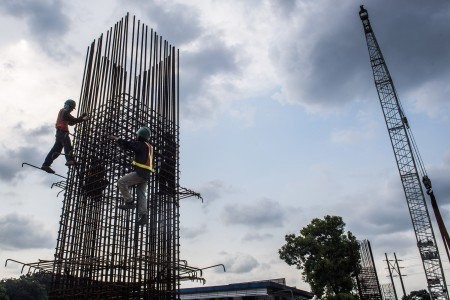Indonesia struggles to achieve infrastructure target
Change Size
 Workers construct a pole for the light rail transit (LRT) system in Jakarta in this file photo. The Jakarta administration will allocate Rp 4.4 trillion (US$352 million) for the LRT project, which is planned to serve transportation needs during the Asian Games 2018 sporting event. (Antara/M. Agung Rajasa)
Workers construct a pole for the light rail transit (LRT) system in Jakarta in this file photo. The Jakarta administration will allocate Rp 4.4 trillion (US$352 million) for the LRT project, which is planned to serve transportation needs during the Asian Games 2018 sporting event. (Antara/M. Agung Rajasa)
I
n the past, having a decent house was merely a dream for Dersinah, 51. Working as a farmer with an uncertain monthly income forced her to live in a shanty.
Things have since changed after she received assistance from the Public Works and Public Housing Ministry to revamp her house through a program called self-help housing assistance (BSPS). Now she lives in a decent house.
The ministry is responsible for managing the country’s public infrastructure, including housing for 2 million people nationwide.
“I am thankful for the program and for the teamwork of the people that go hand in hand in making this possible,” said Dersinah, a mother of two who lives in Citendo subdistrict, Kuningan regency, West Java.
Near her village, there is a dam project aimed at irrigating Kuningan and Brebes in Central Java. The project, started in 2013, is expected to finish by 2017 and will distribute water to both regencies. The government plans to build 65 new dams by the end of 2019.
Building dams is part of President Joko “Jokowi” Widodo’s ambitious plan to enhance infrastructure in Indonesia, including boosting road connectivity and providing affordable housing for low-income citizens.
In a bid to accelerate the progress, Jokowi’s administration has made several moves including revoking laws and red-tape deemed to have hindered the development. The President also made a bold move by cutting fuel subsidies to fund infrastructure projects at the beginning of his administration.
Among his flagship infrastructure projects is the Pemalang-Batang toll road, which is vital for the Java island northern coast road (Pantura) as it is the main road connecting Jakarta-Semarang-Surabaya.
Despite the success stories, however, the plan has to face the bitter reality that it requires a staggering amount of money.
The ministry has suffered a double blow from budget cuts. It lost Rp 6.9 trillion (US$531.5 million) after previously suffering a Rp 8.4 trillion cut in the first round. Construction of non-priority infrastructure projects will be disrupted and delayed following the cuts.
With almost half of the figure slashed from its Bina Marga Directorate General, which oversees road construction, the development of 207.3 kilometers of new roads in Papua and West Papua this year will be heavily affected, despite Jokowi’s pledge to bring more inclusive development to the easternmost provinces.
Public Works and Public House Minister Basuki Hadimuljono acknowledged that the budget portion designated for the eastern part of the country needed a gradual increase and attention.
“The construction projects in Sumatra and Java are better due to existing infrastructure. In other areas, however, we have to build from zero,” he said on Friday.
Three months before the year-end, the ministry disbursed 55.83 percent of its 2016 budget, 59.56 percent of which was channeled to build infrastructure. The figure is higher than that within the same period last year when the absorption stood at 42.9 percent.
Basuki said land acquisition was one of the significant problems in realizing the plan, citing the Slinga dam project in Purbalingga, Central Java, as an example.
The ministry was pushed to find creative ways to attract investment while having to optimize the limited budget, he said, highlighting the issuance of the presidential instruction (Inpres) on cutting red tape in order to pave ways for the private sector to invest in infrastructure projects.
Institute for Development and Finance (Indef) executive director Enny Sri Hartati said on Sunday that the government should prioritize infrastructure development, which relates to the food sector, including the construction and revitalization of dams. She added that dam construction would directly affect agricultural productivity, which would result in food sufficiency and minimize price fluctuations.
University of Indonesia economist Fithra Faisal Hastiadi said the government should keep building roads and bridges amid the limited budget, reasoning that both roads and bridges were the most basic infrastructure. (fac/wnd)
______________________________________
To receive comprehensive and earlier access to The Jakarta Post print edition, please subscribe to our epaper through iOS' iTunes, Android's Google Play, Blackberry World or Microsoft's Windows Store. Subscription includes free daily editions of The Nation, The Star Malaysia, the Philippine Daily Inquirer and Asia News.
For print subscription, please contact our call center at (+6221) 5360014 or subscription@thejakartapost.com









